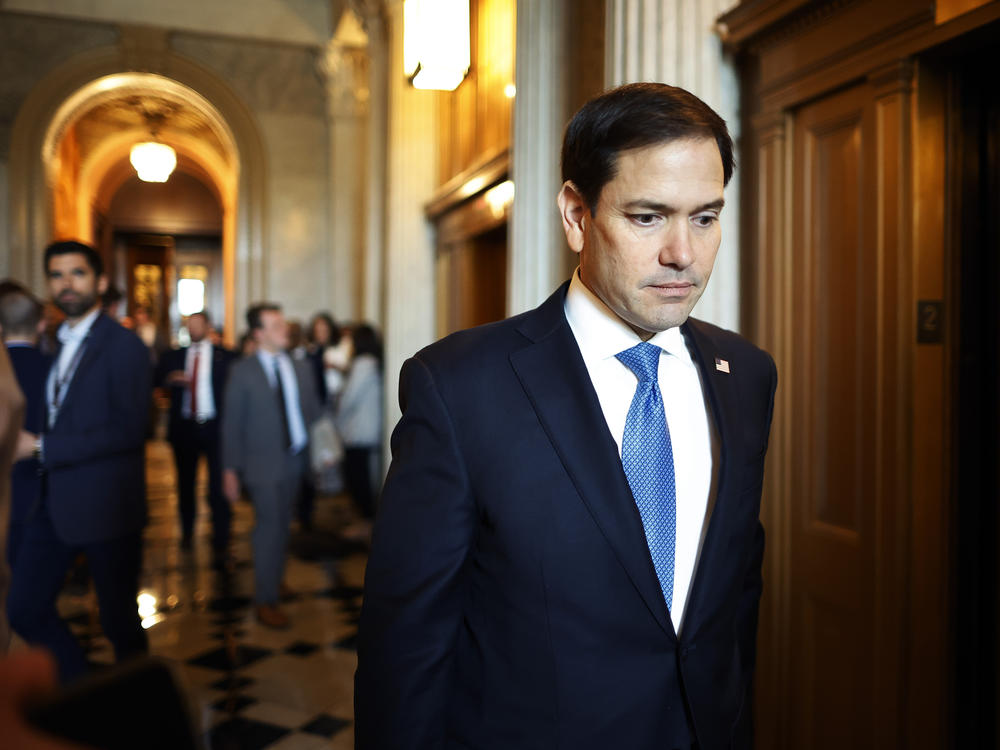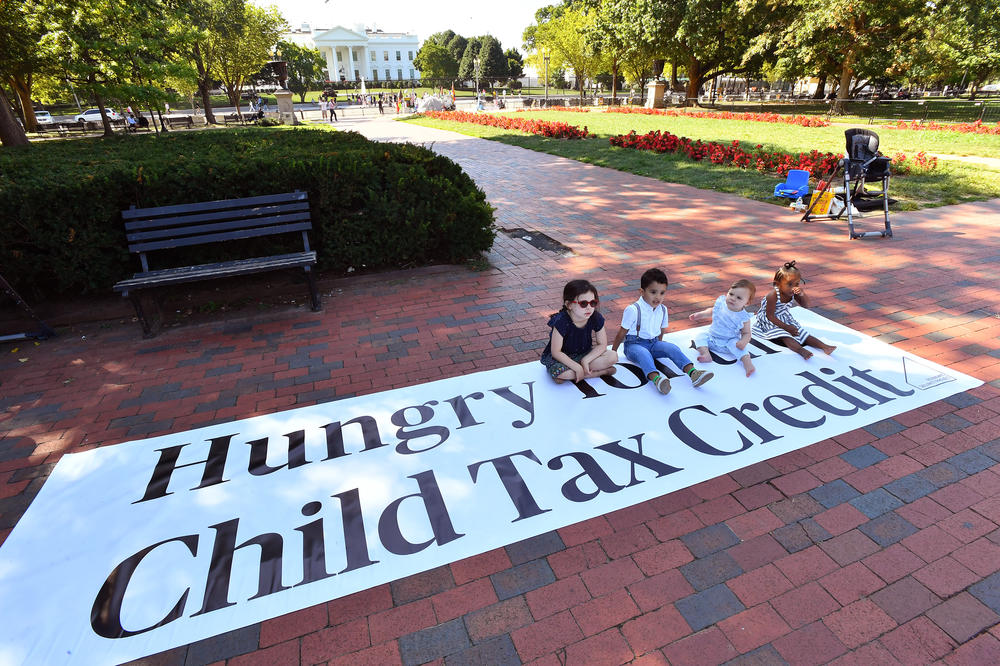Section Branding
Header Content
This Republican senator wants an expanded child tax credit — with work requirements
Primary Content
An unusual thing happened a couple of years ago: nearly 3 million children in the United States were lifted out of poverty.
That's because of an expansion of the child tax credit, which was passed as a part of the federal COVID relief package.
Fast forward 2.5 years — those expanded tax credits have expired and new census data released last week showed child poverty has surged to pre-pandemic levels.
Many in Washington, D.C., would like to see the child tax credit expanded again, including Florida Sen. Marco Rubio, a Republican.
But Rubio, unlike his Democratic counterparts, wants the expanded child tax credit to include work requirements.
All Things Considered host Juana Summers talks to Rubio about why he thinks work requirements are necessary, and how Republicans and Democrats can find common ground.
This interview has been lightly edited for length and clarity.
Interview highlights
Juana Summers: Let's just get right into it. Explain why you think work requirements are so necessary here?
Marco Rubio: I mean, certainly "work requirement" is one way to describe it. But, basically, the way we've always viewed the child tax credit is you have a job, and you get to expense the cost of raising children, the way businesses get to expend the investments they make. If we can have tax breaks for businesses that make investments, we most certainly should have the ability of working people to keep more of the money they earn in order to raise their children, which is the most important investment we're making in our country.
So that's what the tax credit has always been. And it's a credit against taxes. Now, the problem was that people under a certain income level had no income tax liability to apply it to, which is why we always argued that it should be applied — at least part of it — towards the payroll tax, which is the primary tax liability of working parents.
So, yeah, it requires you to have a job, because it requires you to have some tax liability that the credit applies towards. But I also think it recognizes that the purpose of this program always was, and should continue to be, to allow working parents raising children to be able to keep more of the money they earn, to be able to afford, or help afford, the costs of raising children in the modern economy.
Summers: I just want to take a second to spell out the data here, because I think it's really important. The new data that came out last week showed that all of the gains when it comes to child poverty that we saw in 2021, they were lost in 2022. There was an alarming rise in child poverty last year from 5.2% in 2021, to 12.4%, in 2022. So, given the fact that we're seeing this problem balloon into this huge need, how would you go about addressing that in an urgent manner?
Rubio: Well, first of all, I think to measure just based on one year, you basically had one year in which you had a child allowance, it wasn't a child tax credit, from $2,000 per child to $3,600 per child. So, suddenly, families are reporting $3,600 per child, zero to five [years old], and $3,000 for children above six up to 17. And then it expires. So you're going to have that jump.
But that is different from what we're trying to achieve here, which is we're trying to achieve an economy that produces the kind of work that parents are no longer in poverty, families are no longer in poverty. And that's a much bigger struggle. And that really should be the cornerstone of what our focus is on economic policy. And I think we've lost that focus over the last 20 or 30 years, as we have seen economic decisions driven purely by market outcomes without considering the national interest in regards to that creation of that stable work.
Summers: This is a topic we've been following closely on the show and my colleague, Ari Shapiro, spoke to a pediatrician, Megan Sandel, last week. And this is what she told him about what she's seeing right now:
Megan Sandel: What we're starting to see is kids flatlining. Kids who should be growing, should be gaining weight, should be, frankly, growing the brain that they need for the rest of their lives. And we're seeing kids not grow. We're seeing kids lose weight, which, when you're three or four years old, that is a medical emergency — what's going on? And a lot of times when we really dig deeper, it's simply because people can't afford enough food and are stretching beyond what they can deal with.
Summers: Senator Rubio, what would you say to someone like Dr. Sandel, who is seeing these kids as patients day in and day out? And who is clearly not just worried, but deeply frustrated and alarmed by what she is seeing in these patients?
Rubio: Well, I would say it's terrible to hear that, in the most advanced economy in the history of the world, in the wealthiest nation in the world, where an extraordinary amount of wealth is being produced every day. And we don't envy that wealth. And we don't discourage it.
But I think it also points to the point I've made now a number of times in this interview, and that is that when we made the decision 20 or 30 years ago, that the only thing that mattered was efficiency in our economy [and] completely ignored our national interest in having an economy that both created economic growth and at the same time created stable, reliable, dignified, good paying jobs for Americans, we created an environment where people are struggling [with] how to find that kind of work.
And the other is inflation. When you look at the basic essentials — food, gasoline prices — all those prices have climbed alarmingly high for everyone. And that, of course, puts an even greater strain on those that are struggling to begin with to find jobs that pay enough. I think the current levels of how we measure inflation traditionally, do not sufficiently take into account what it means when the things that cost more — sometimes 200% increases — are the basic necessities.
Summers: I understand throughout our conversation, there's kind of this fundamental notion of this as a tax credit, so therefore, it's linked to someone's employment. But I guess after hearing what Dr. Sandel just said, and the urgency with which she's talking about the three- or four-year-old kids that are losing weight and not growing the way that they should, how do you think about the best way to reach those families and those kids with the urgency that their health needs to ensure that the kids who need the help the most are able to receive it as quickly as possible?
Rubio: Well, listen, I think in that realm, and again, children should not be punished because parents don't want to go work or what have you, or parents can't find a job, you know. And there's a bunch of other programs out there that we should have the debate over: whether there should be an increase in nutritional assistance, whether there needs to be a more targeted focus on some of those social safety net programs for purposes of helping children who face these circumstances. My argument with a tax credit is, it's not the notion, it's what it's always been. The child tax credit has always been, and is widely been accepted as, a tax credit to be applied towards earnings.
If you turn it into just simply a transfer payment, you've absolutely gutted the tax credit concept, and I think you endanger it moving forward. Because that's not what people thought they were voting for when they first authorized it. It's tough enough as it is to get it increased, if you turn it into a transfer payment, you might as well not even call it a tax credit anymore, it becomes a transfer payment program.
Summers: Senator, I feel like I end every interview that I have with a lawmaker this way, but I think it's important: the country is so divided right now. You and your Republican colleagues have one vision in this area, and Democrats have another. There are these millions of kids who have been pushed back into poverty. How do you find common ground?
Rubio: Well, I don't know of anybody who's in favor of children being in poverty. I think the debate has to be over how you solve it. And in my mind, I think one of the things we need to discuss in this country more broadly is what should be the primary driver of public policy, both domestic and foreign? And I think the answer is the national interest, and how do you define the national interest and the common good. And I believe you have to have a vibrant growing economy that encourages people to invest money to create new businesses and grow. And we have no problem with people making a lot of money if they start a business and are very successful. And that is important, and that is essential, but that alone is not enough.
Part of that equation has to be, "And are they creating wealth and growth and prosperity in a way that is also creating good, stable, reliable work for millions and millions of American workers?" And that second part of the equation is what has been left out for the last 20 or 30 years. So we need a consensus, a governing consensus, in this country that economic policy needs to be about two things: growth and prosperity in a free enterprise economy; and the creation of good, reliable, dignified work for American workers, including those that don't have four-year degrees from a college or advanced education from a master's program or what have you.
Copyright 2023 NPR. To see more, visit https://www.npr.org.


